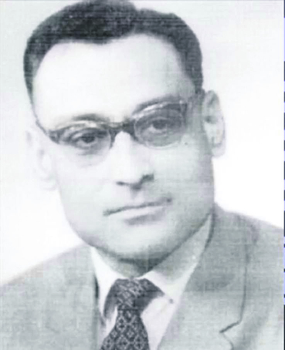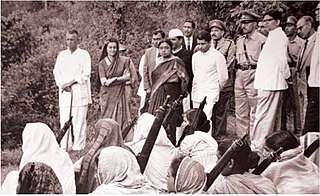Related Research Articles

The Intelligence Bureau (IB) is India's internal security and counterintelligence agency under the Ministry of Home Affairs. It was founded in 1887 as Central Special Branch,and is reputed to be the oldest such organisation in the world.
The Research and Analysis Wing (R&AW) is the foreign intelligence agency of India. The agency's primary function is gathering foreign intelligence,counter-terrorism,counter-proliferation,advising Indian policymakers,and advancing India's foreign strategic interests. It is also involved in the security of India's nuclear programme.

Rabinder Singh was an Indian civil servant and military officer,who has served as a Joint Secretary of the Research and Analysis Wing (R&AW). He defected to the United States in 2004.

The National Security Advisor is the senior official on the National Security Council of India,and the chief advisor to the Prime Minister of India on national security policy and international affairs. In 2019,the term of Ajit Doval the current NSA was extended for another 5-year term,and has been assigned the rank of a Union Cabinet Minister and ranks at the seventh position in the Indian Order of Precedence.
The National Security Council (NSC) of India is an executive government agency tasked with advising the Prime Minister's Office on matters of national security and strategic interest. It was established by the former Prime Minister of India Atal Bihari Vajpayee on 19 November 1998,with Brajesh Mishra as the first National Security Advisor.

Rameshwar Nath Kao was an Indian spymaster and the first chief of India's external intelligence agency,the Research and Analysis Wing (R&AW) from its founding in 1968 to 1977. Kao was one of India's foremost intelligence officers,and helped build R&AW.
The Aviation Research Centre (ARC) is India's imagery intelligence organisation,a part of the Directorate General of Security,run by the Research and Analysis Wing (R&AW). It started functioning in November 1962,in the wake of the Sino-Indian War,as an extension of the Intelligence Bureau,but placed under the Ministry of External Affairs.

The National Technical Research Organisation (NTRO) is a technical intelligence agency of India. It was set up in 2004. The agency reports to the National Security Advisor and to the Prime Minister's Office. NTRO also comprises the National Critical Information Infrastructure Protection Centre and the National Institute of Cryptology Research and Development.
Ashok Chaturvedi,IPS was the chief of India's external intelligence agency the Research and Analysis Wing (R&AW) from 1 February 2007 to 31 January 2009. Chaturvedi succeeded P.K.H. Tharakan,a 1968 batch officer of the IPS Kerala cadre who retired on 31 January 2007.
Below is a list of speculated CIA activities in India.
Bahukutumbi Raman,also referred to as B. Raman,was an Additional Secretary of the Cabinet Secretariat of the Government of India and head of the counter-terrorism division of the Research and Analysis Wing. Until his death in 2013,he was the director of the Institute for Topical Studies,Chennai. B. Raman was also a contributor to the South Asia Analysis Group (SAAG). As a former intelligence official,B. Raman regularly wrote about security,counter-terrorism and military issues regarding India and South Asia. He was considered one of India's foremost security experts.
Sanjeev Tripathi is member of the BJP and former Secretary of the Research and Analysis Wing. Tripathi is the son-in-law of Former R&AW secretary,G.S. Bajpai,and comes from a family of Bareilly,Uttar Pradesh. A keen sportsman,he topped the civil service exam in 1972,and joined the Uttar Pradesh cadre. Few years later,he switched to RAW,resigning from the IPS,and was absorbed in the Research &Analysis Service (RAS),which feeds the ranks of RAW. Mr. Tripathi is the first Secretary (R) to be from the RAS cadre in its more than four-decade history.
The Chairperson and CEO of the Indian Railway Board is the administrative head of the Indian Railways,which functions under the overall control of the Parliament of India through the Minister for railways. The chairperson also serves as ex-officio Principal Secretary to the Government of India for the Ministry of Railways.
NETRA is a software network developed by India's Centre for Artificial Intelligence and Robotics (CAIR),a Defence Research and Development Organisation (DRDO) laboratory,and is used by the Intelligence Bureau,India's domestic intelligence agency,and the Research and Analysis Wing (R&AW),the country's external intelligence agency to intercept and analyse internet traffic using pre-defined filters. The program was tested at smaller scales by various national security agencies,and is reported to be deployed nationwide as of 2022.

Vikram Sood is the former head of India's foreign intelligence agency,the Research and Analysis Wing (R&AW),and an advisor to the Observer Research Foundation,an independent public policy think tank in New Delhi. Sood was an officer of the Indian Postal Service (IPoS) before he joined the intelligence organisation R&AW and later served as its secretary from 2000 to 2003. He retired as a career intelligence officer with 31 years of service on 31 March 2003.
K. Sankaran Nair,known as Colonel Menon among his colleagues,was an Indian civil servant,diplomat and the director of Research and Analysis Wing. He served as the Indian High Commissioner to Singapore from 1986 to 1988 and was the last surviving member of the Indian Imperial Police. He was reported to have played a crucial role in the formation of Bangladesh,through R&AW operations during the Bangladesh Liberation War.
Anil Dhasmana is former Chief of National Technical Research Organisation (NTRO). He was also the Chief of the Research and Analysis Wing (R&AW),India's foreign intelligence service. He was appointed as the Chief of R&AW as the post fell vacant on 31 January 2017 following the retirement of the incumbent.

The Unending Game:A Former R&AW Chief's Insights into Espionage is a 2018 book by Vikram Sood,former head of India's foreign intelligence agency,the Research and Analysis Wing (R&AW). According to Sood his book is not a memoir but a beginner's guide in intelligence and espionage. Sood tries to clarify that the real world of espionage is not like James Bond movies and much more than just "cloak and dagger" operations;with John le Carre's novels about George Smiley being a better comparison to the reality. The book further gives insights into the methods of intelligence collection and espionage and the relevance in the scope of a country's national interests.

The Directorate General of Security is an organisation of covert operations under India's Cabinet Secretariat. It is one of the four legally defined intelligence organisations of India and listed in the Schedule of the Intelligence Organisations Act,1985,the other three being I.B.,R&AW and NTRO. Since 1971,the Secretary,Research and Analysis Wing has usually held the post of Director General. This organisation used to be composed of Special Service Bureau,Aviation Research Centre,Special Frontier Force and Chief Inspectorate of Armaments. Since the shifting of SSB and CIOA to the Ministry of Home Affairs in 2001,DGS consists of ARC and SFF only. The Special Group,a non-Tibetan and Sarsawa-based unit of SFF,is also a DGS component.
References
- ↑ The Civil List of Indian Police Service, Vol. 30, 1986, Ministry of Home Affairs, Government of India, page 9
- ↑ "K C Verma Moves in as New Chief of RAW". news.outlookindia.com. Archived from the original on 18 July 2011. Retrieved 20 August 2010.
- ↑ Manish Tiwari, Fiasco on Flight 334, Hindustan Times, page 2, 12 July 2009
- ↑ [ dead link ]
- ↑ "K C Verma to be new RAW chief". Indianexpress.com. 25 January 2009. Retrieved 20 August 2010.
- ↑ "K.C. Verma to be new RAW chief". Thaindian.com. 25 January 2009. Retrieved 20 August 2010.
- ↑ "Can its new chief turn R&AW around?". Rediff.com. Retrieved 20 August 2010.
- ↑ Appointments by ACC, Press Information Bureau, 28 December 2010, archived copy
- ↑ It’s spy vs spy for top RAW job, The Tribune, 29 November 2010
- ↑ Important RAW wing is headless for months, The Sunday Guardian, 30 January 2011
- ↑ PV Kumar named NTRO chief, DNA India, 1 April 2011